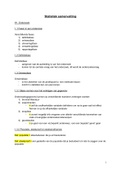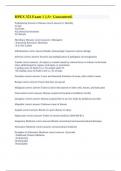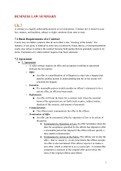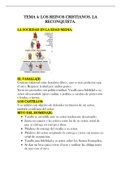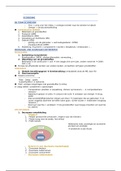1: Organic chemistry is key to the origin of life
Living organisms share a common set of major elements, reflecting their
common evolutionary origin. (Supporting detail: The overall percentages of
carbon, hydrogen, oxygen, nitrogen, sulfur, and phosphorus are relatively
uniform across different organisms.)
Carbon's unique chemical versatility enables the creation of an infinite
variety of organic molecules. (Supporting detail: Carbon's ability to form four
bonds allows for the construction of an inexhaustible variety of organic
molecules.)
2: Carbon atoms can form diverse molecules by
bonding to four other atoms
Carbon has 6 electrons, with 4 valence electrons in a shell that can hold up
to 8 electrons.
Carbon completes its valence shell by forming covalent bonds, either single
or double, in organic molecules.
Carbon acts as an intersection point for branching, allowing for complex
structures.
When carbon forms four single bonds, it has a tetrahedral shape.
In molecules with more carbons, each carbon bonded to four other atoms
also has a tetrahedral shape.
When two carbon atoms are joined by a double bond, the bonds are in the
same plane.
The valence of an atom determines the number of covalent bonds it can
form.
Carbon's electron configuration gives it covalent compatibility with many
elements.
Carbon dioxide is a molecule with a carbon atom joined to two oxygen atoms
by double bonds.
, Molecular Diversity Arising from Variation in Carbon Skeletons
Carbon chains form the basis of most organic molecules, varying in length
and structure, contributing to molecular complexity and diversity.
Hydrocarbons, consisting of carbon and hydrogen, are major components of
petroleum and have hydrophobic properties, releasing a large amount of
energy.
Isomers, compounds with the same number of atoms but different
structures, include structural isomers, cis-trans isomers, and enantiomers.
Structural isomers differ in covalent arrangements, while cis-trans isomers
have different spatial arrangements due to double bonds.
Enantiomers are mirror images of each other and can have different
biological activities, with only one isomer being active.
Living organisms share a common set of major elements, reflecting their
common evolutionary origin. (Supporting detail: The overall percentages of
carbon, hydrogen, oxygen, nitrogen, sulfur, and phosphorus are relatively
uniform across different organisms.)
Carbon's unique chemical versatility enables the creation of an infinite
variety of organic molecules. (Supporting detail: Carbon's ability to form four
bonds allows for the construction of an inexhaustible variety of organic
molecules.)
2: Carbon atoms can form diverse molecules by
bonding to four other atoms
Carbon has 6 electrons, with 4 valence electrons in a shell that can hold up
to 8 electrons.
Carbon completes its valence shell by forming covalent bonds, either single
or double, in organic molecules.
Carbon acts as an intersection point for branching, allowing for complex
structures.
When carbon forms four single bonds, it has a tetrahedral shape.
In molecules with more carbons, each carbon bonded to four other atoms
also has a tetrahedral shape.
When two carbon atoms are joined by a double bond, the bonds are in the
same plane.
The valence of an atom determines the number of covalent bonds it can
form.
Carbon's electron configuration gives it covalent compatibility with many
elements.
Carbon dioxide is a molecule with a carbon atom joined to two oxygen atoms
by double bonds.
, Molecular Diversity Arising from Variation in Carbon Skeletons
Carbon chains form the basis of most organic molecules, varying in length
and structure, contributing to molecular complexity and diversity.
Hydrocarbons, consisting of carbon and hydrogen, are major components of
petroleum and have hydrophobic properties, releasing a large amount of
energy.
Isomers, compounds with the same number of atoms but different
structures, include structural isomers, cis-trans isomers, and enantiomers.
Structural isomers differ in covalent arrangements, while cis-trans isomers
have different spatial arrangements due to double bonds.
Enantiomers are mirror images of each other and can have different
biological activities, with only one isomer being active.




